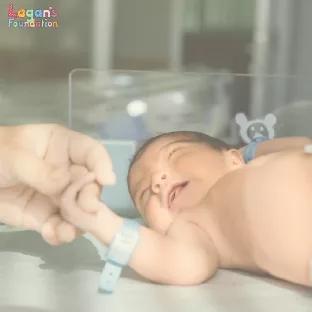
5 Things Families of Children with Congenital Heart Defects Want to Know
Read our guide to congenital heart defects to find out more about the key things families would like to know.
Congenital heart defects are present at birth and can affect the structure of a person’s heart. As medical care and treatment has advanced over the years, children with heart defects are living longer and healthier lives.
What are the main types of congenital heart disease in children?
The most common type of heart disease in children is a bicuspid aortic valve (BAV).
Normally, the aortic valve opens and shuts to allow blood to flow from the heart to the aorta, which is the major blood vessel that brings oxygen-rich blood to the body.
BAV is present at birth (congenital), and it is when an abnormal aortic valve develops during the early weeks of pregnancy, whilst the baby’s heart is still developing. A BAV may not be completely effective at stopping blood from flowing back into the heart, and it may become stiff and not open up properly.
BAV causes the heart to work harder, ensuring the blood is pumped to the aorta. It is often more common among males than females.
Other congenital heart defects in children include:
- Ventricular septal defects (VSD): This occurs when a hole is present in the heart’s lower septum, which is the divide between the left and right side.
- Atrial septal defects (ASD): This occurs when a hole is present in the heart’s upper septum, which is the divide between the left and right side.
Thanks to the development in detection and treatment, many children with congenital heart diseases can live happy and healthy lives.

Symptoms of congenital heart disease in children
General signs of congenital heart disease can include:
- A blue tinge to the nails, skin or lips, known as cyanosis
- Rapid breathing
- Rapid heartbeat
- Swelling of the legs, tummy and around the eyes
- Extreme tiredness and fatigue
- Fainting during exercise
- Swelling of the hands, feet and ankles
5 things you should know about Congenital Heart Defects in children
As medical care and treatment has advanced, many children who suffer from congenital heart defects go on to live long and healthy lives. Read our 5 things you should know about heart defects to find out more.
Heart defects are more common than you think
Congenital heart disease is one of the most common types of birth defects in the UK, affecting almost 1 in 100 babies born. In fact, it is estimated that there are around 7.6 million people living with heart and circulatory diseases in the UK.
We have an ageing and growing population, with improved survival rates from heart disease, we are likely to see these numbers rise further.
Heart defects can be diagnosed before, during or after birth
Some heart defects can be found during pregnancy by an ultrasound, whilst others aren’t detected until birth through a newborn screening, or even during childhood or adulthood.
Screening newborns for heart defects early on allows them to be treated early, which could potentially prevent other health problems from occurring.
Treatment is available
Treatment for congenital heart disease will depend on the type and severity of the condition. However, for many babies diagnosed with congenital heart defects, their condition is a minor problem which doesn’t need any treatment.
Others may need some form of treatment such as medication or surgery. There are also new techniques and procedures that can be done instead of surgery.
People with heart defects need lifelong care
Even with the advanced and improved treatments, many people with heart disease are not cured and may need lifelong care. People with heart defects can develop other health conditions over time depending on their specific heart defect and the severity of it.
Transitions into adolescence for children can be difficult, whether that means navigating changes within the home or having new care assistants. It is especially important for families who have children with birth defects to begin planning for this change so they can lead healthy lives.
People with heart defects are living longer
As medical care and treatment advances, people with heart defects are living longer and healthier lives. As survival rates increase, researchers are continuing to look at health issues across the lifespan of survivors to ensure people born with heart defects are getting the care they need at every stage of life.
Support for families and children with congenital heart disease
At Lagan’s Foundation, we provide respite and care for families with children who have congenital heart disease. Caring for children with complex care needs is challenging, which is why we believe families often need time away to rest.
Our purpose is to provide unique at home and in hospital care to support parents in their caring role.
If you have a child who suffers from congenital heart disease, feel free to get in touch with us to find out how we can provide the help and support you may need.

![Understanding Total Anomalous Pulmonary Venous Return [TAPVR]](/wp-content/uploads/2025/04/Understanding-Total-Anomalous-Pulmonary-Venous-Return-FI-312x312-c-default.jpg)


